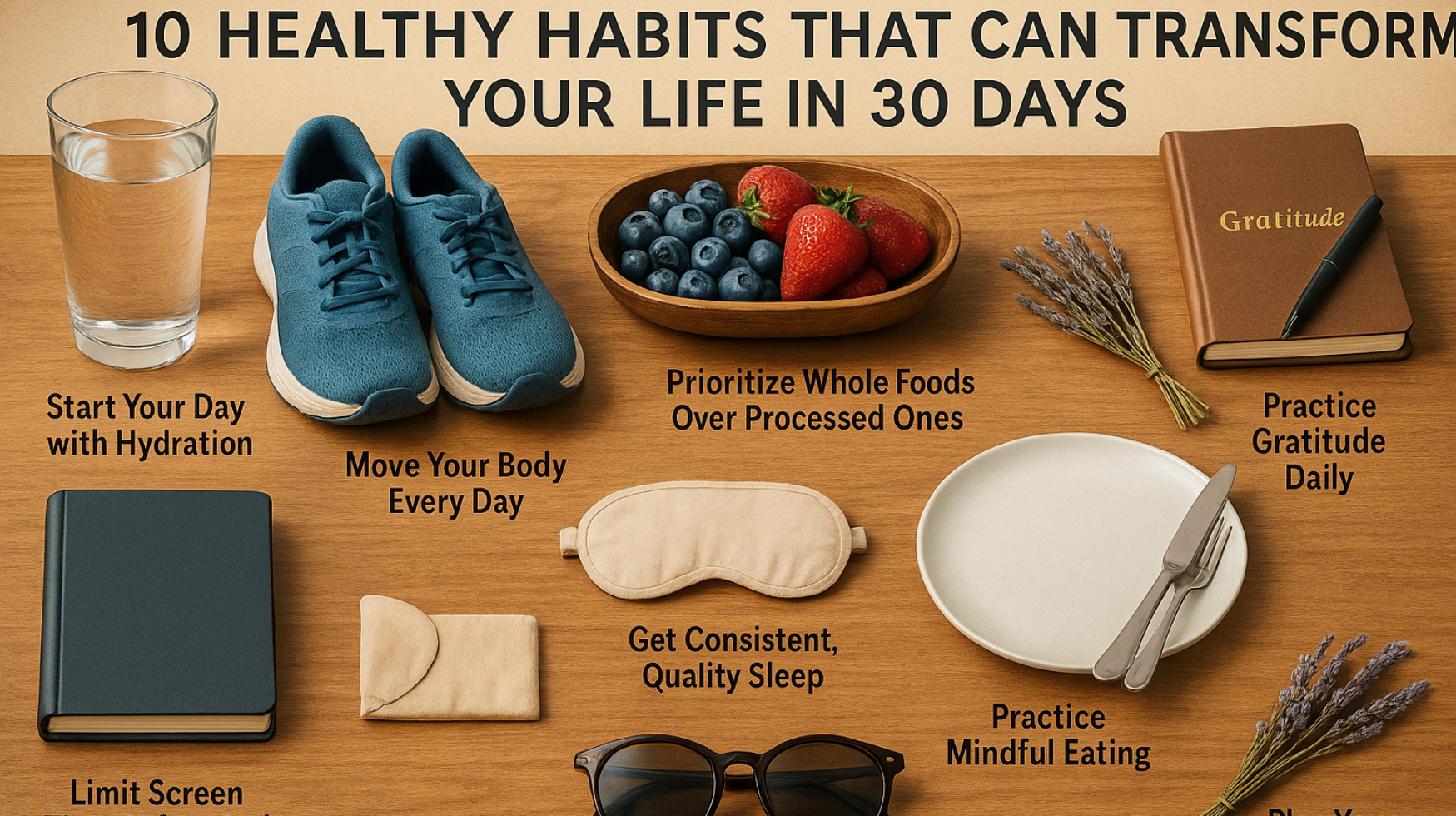Living a healthier life is not about chasing perfection—it’s about making consistent, realistic changes that you can sustain over time. While dramatic transformations can seem appealing, the truth is that meaningful results often come from small, daily improvements.
This 30-day guide focuses on ten simple yet powerful habits that can significantly improve your physical health, mental clarity, and emotional balance. You don’t need expensive equipment, a gym membership, or complicated plans. All you need is the willingness to commit and stay consistent.
By the end of these 30 days, you’ll not only feel the difference—you’ll see it reflected in your energy levels, mood, and overall outlook on life.
1. Start Your Day with Hydration
When you wake up, your body is dehydrated from hours without water. The first drink of your day is more than just a thirst quencher—it’s a signal to your body that it’s time to wake up and start functioning at its best.
Why it matters:
- Kickstarts metabolism: Water helps activate your digestive system.
- Flushes out toxins: Overnight, your body’s repair processes release waste products that water helps eliminate.
- Boosts brain function: Even mild dehydration can impair cognitive performance.
Practical ways to build the habit:
- Place a glass or bottle of water next to your bed before sleeping.
- Add a squeeze of lemon for vitamin C and a refreshing taste.
- Drink at least 250–500ml before having your morning coffee or tea.
Pro tip: Pair this habit with light stretching to further wake up your muscles and joints.
2. Move Your Body Every Day
Our bodies are designed to move, yet modern life often keeps us sitting for hours. Daily movement helps maintain joint flexibility, improve blood circulation, and release endorphins, which naturally elevate mood.
Forms of daily movement:
- A 30-minute brisk walk.
- Short stretching breaks during work hours.
- Bodyweight workouts like push-ups, squats, and planks.
- Dancing to your favorite songs.
Habit stacking tip: Tie movement to an existing activity. For example, always take a short walk after lunch, or do a few stretches every time you finish a phone call.
3. Prioritize Whole Foods Over Processed Ones
Whole foods—fruits, vegetables, legumes, lean proteins, whole grains—are nutrient-rich and free from excess additives. Processed foods, on the other hand, are often high in sugar, salt, and unhealthy fats.
Benefits of whole foods:
- More vitamins and minerals.
- Better digestion due to fiber content.
- Stable energy levels without sugar crashes.
Easy swaps to start with:
- Replace soda with sparkling water and fruit slices.
- Choose whole grain bread instead of white bread.
- Snack on nuts or fresh fruit instead of packaged chips.
4. Practice Gratitude Daily
Gratitude is more than just a nice thought—it’s a mental health tool backed by science. Studies show that people who regularly express gratitude experience lower stress levels, better sleep, and stronger relationships.
Simple gratitude exercises:
- Write down three things you’re grateful for every morning.
- Say one thing you’re thankful for at dinner each night.
- Keep a “gratitude jar” and read your notes at the end of the month.
5. Limit Screen Time Before Bed
Phones, tablets, and laptops emit blue light that interferes with your body’s melatonin production—the hormone responsible for sleep. Too much screen time before bed can delay sleep onset and reduce sleep quality.
Better evening habits:
- Turn off devices 30–60 minutes before bedtime.
- Replace scrolling with reading, journaling, or light stretching.
- Use warm lighting in your bedroom to signal to your body that it’s time to wind down.
6. Get Consistent, Quality Sleep
Quality sleep is as essential as good nutrition and exercise. It’s during sleep that your body repairs tissues, consolidates memories, and regulates hormones.
How to improve sleep quality:
- Maintain a consistent sleep schedule, even on weekends.
- Keep your room cool, dark, and quiet.
- Avoid heavy meals, caffeine, and alcohol close to bedtime.
7. Practice Mindful Eating
Mindful eating is about being fully present during meals, paying attention to flavors, textures, and hunger cues. It helps prevent overeating and promotes better digestion.
Mindful eating techniques:
- Put your phone away during meals.
- Take smaller bites and chew thoroughly.
- Pause halfway through your meal and ask, “Am I still hungry?”
8. Incorporate Deep Breathing Exercises
Deep breathing activates your body’s relaxation response, reducing stress and promoting calmness.
One easy method:
- Inhale through your nose for 4 seconds.
- Hold for 4 seconds.
- Exhale through your mouth for 6 seconds.
- Repeat for 5 minutes.
9. Spend Time Outdoors
Nature has a powerful effect on mental health. Sunlight boosts vitamin D production, which supports mood regulation and immune function.
Ideas for outdoor time:
- Have your morning coffee outside.
- Take short walks during work breaks.
- Plan weekend activities in parks or nature reserves.
10. Plan Your Day the Night Before
Planning reduces decision fatigue and helps you start each day with purpose.
Simple nightly planning:
- Write down your top three priorities for tomorrow.
- Prepare clothes, meals, and work items in advance.
- Set an intention for the day ahead.
How to Make These Habits Stick for the Long Term
The best way to succeed is to start small and build gradually.
- Select 2–3 habits from this list.
- Commit to them every day for 30 days.
- Once they feel natural, add more habits.
Tracking progress can also help—use a journal, an app, or a simple checklist.
Final Thoughts
Healthy living is not about quick fixes; it’s about creating a lifestyle that supports your best self. These ten habits are simple, but their effects compound over time. Start today, and in 30 days, you’ll not only see changes—you’ll feel them in your energy, mood, and outlook.

